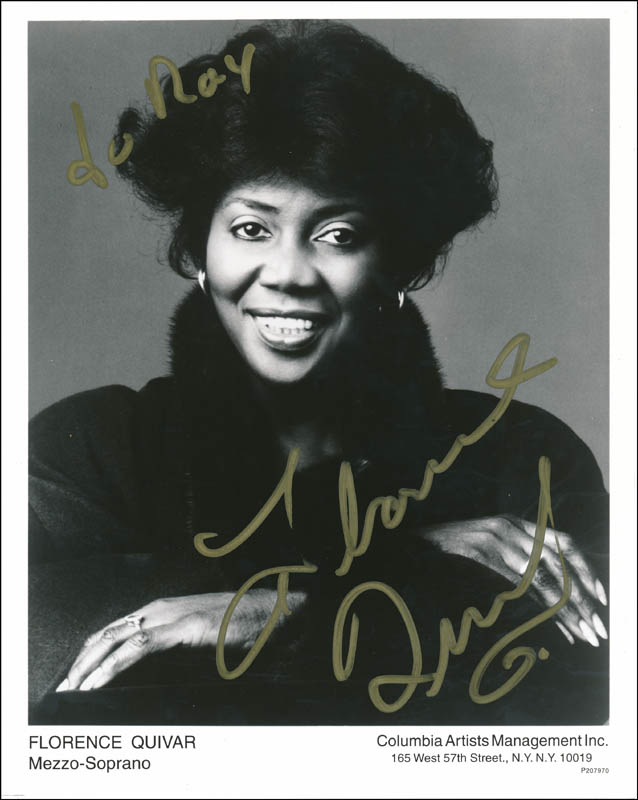

|
A native of Philadelphia, Florence Quivar is a graduate of the Philadelphia Academy of Music and was a member of the Juilliard Opera Theatre. She has received numerous awards, including the National Opera Institute Award, the Baltimore Lyric Opera Competition, and the Marian Anderson Vocal Competition. Renowned for her rich mezzo-soprano voice, Ms. Quivar is considered one of America’s most distinguished artists. She has enjoyed many seasons at the Metropolitan Opera and has also sung with the Met on tour in Spain. In past seasons at the Met she won critical acclaim for her performances in Dialogues of the Carmelites, Oedipus Rex, L’italiana in Algeri, and Le prophète, and as Serena in the Met’s historic first production of Porgy and Bess. She appeared as Brangäne in the Los Angeles Music Center Opera’s production of Tristan und Isolde, with Zubin Mehta conducting the Los Angeles Philharmonic. Quivar’s extensive operatic repertoire and wide-ranging concert
repertoire have taken her to opera houses and concert halls throughout
the world. During recent seasons, she performed Beethoven’s Ninth
Symphony with the Boston Symphony Orchestra at Tanglewood, Bernstein’s
Jeremiah Symphony at the Schleswig-Holstein Music
Festival, and Brangäne in Tristan at Houston Grand Opera.
She also made her debut at Lyric Opera of Chicago during the 1997/98 season
in the world premiere production of Anthony Davis’
Amistad.
See my interviews with Thomas Young, Mark S. Doss, and Dennis Russell Davies
== Names which are links in this box and below
refer to my interviews elsewhere on my website. BD |
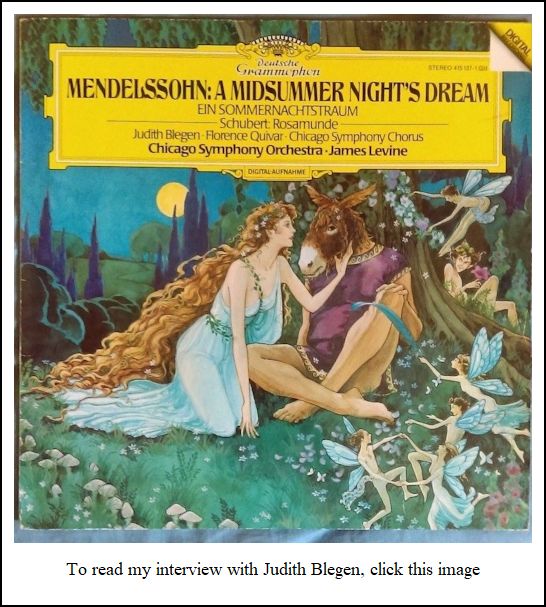 It was on a return visit to the Ravinia Festival in
August of 1992 that I had the privilege of speaking with the distinguished
mezzo. She was warm and charming, and there was much laughter interspersed
with the serious discussion of her artistry. Portions of this conversation
were aired on WNIB, Classical 97 in Chicago on four occasions, and now
the entire interview is presented on this webpage.
It was on a return visit to the Ravinia Festival in
August of 1992 that I had the privilege of speaking with the distinguished
mezzo. She was warm and charming, and there was much laughter interspersed
with the serious discussion of her artistry. Portions of this conversation
were aired on WNIB, Classical 97 in Chicago on four occasions, and now
the entire interview is presented on this webpage.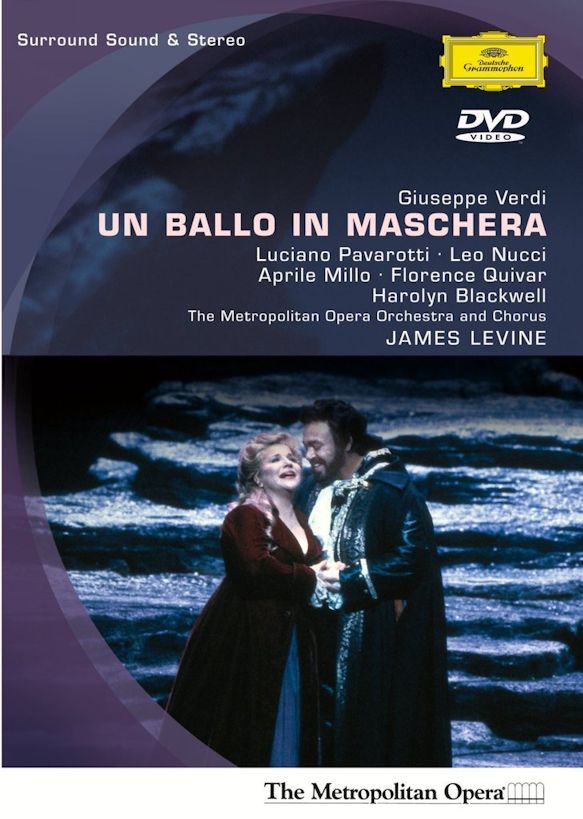 FQ: Right, right. My voice
is deceiving. I can, indeed, do contralto things. I have
that quality in my voice, but I am not a contralto, as they don’t really
exist much anymore anyhow. Yet I always had the agility.
I used to do wonderful Rossini and Mozart things, and then I had this
top. It was just varied, so that rules out a lot of the opera.
I didn’t do a lot of the bread and butter roles, whereas I could with
the Messiahs, with the Bach, and Brahms, and the various things,
and that’s just the way the career went. But now this summer I did
for the first time Amneris. It was a concert version in Israel,
in Tel Aviv. We did five performances, and Un Ballo in Maschera
I’ve done several times. I have done The Italian Girl in Algiers,
and Le Prophète. I’ve done a variety, but it’s been
very diverse, and this year it seems like I’m going into a pattern. Amneris
was the first in the concert version, and in September and October I’m
in New York again doing Un Ballo in Maschera, and then Aïda
for Bologna.
FQ: Right, right. My voice
is deceiving. I can, indeed, do contralto things. I have
that quality in my voice, but I am not a contralto, as they don’t really
exist much anymore anyhow. Yet I always had the agility.
I used to do wonderful Rossini and Mozart things, and then I had this
top. It was just varied, so that rules out a lot of the opera.
I didn’t do a lot of the bread and butter roles, whereas I could with
the Messiahs, with the Bach, and Brahms, and the various things,
and that’s just the way the career went. But now this summer I did
for the first time Amneris. It was a concert version in Israel,
in Tel Aviv. We did five performances, and Un Ballo in Maschera
I’ve done several times. I have done The Italian Girl in Algiers,
and Le Prophète. I’ve done a variety, but it’s been
very diverse, and this year it seems like I’m going into a pattern. Amneris
was the first in the concert version, and in September and October I’m
in New York again doing Un Ballo in Maschera, and then Aïda
for Bologna.|
After coming to the United States, she appeared in a few recitals and concerts in New York City; but ultimately began devoting her time to teaching. During the 1960s and 1970s she taught on the voice faculties of the Manhattan School of Music and the Mannes College of Music. She continued to teach privately up until her death in 1990. |
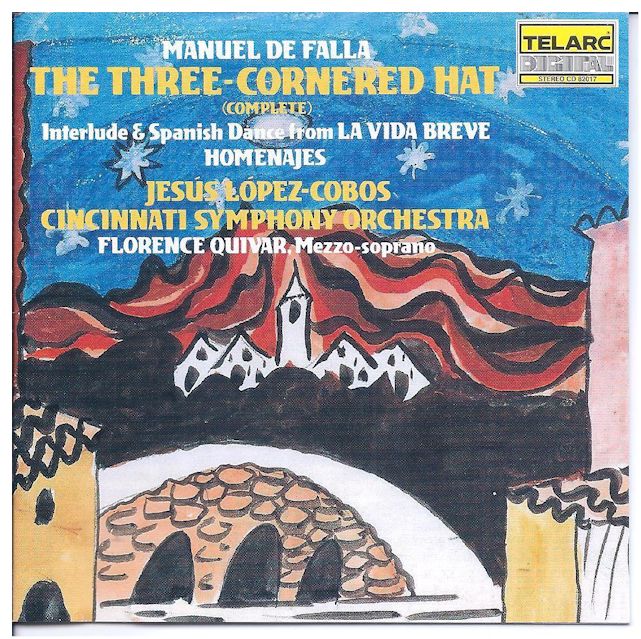 BD: So, if you were offered a role,
even if it was in your vocal range, you would turn it down?
BD: So, if you were offered a role,
even if it was in your vocal range, you would turn it down?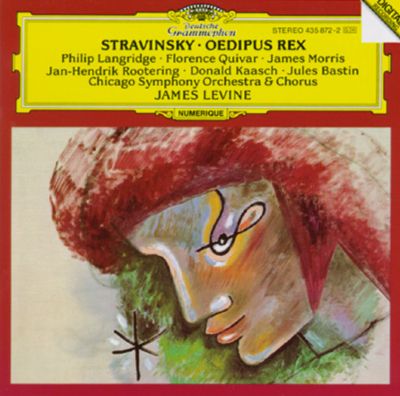 FQ: Yes, I hate recording.
FQ: Yes, I hate recording.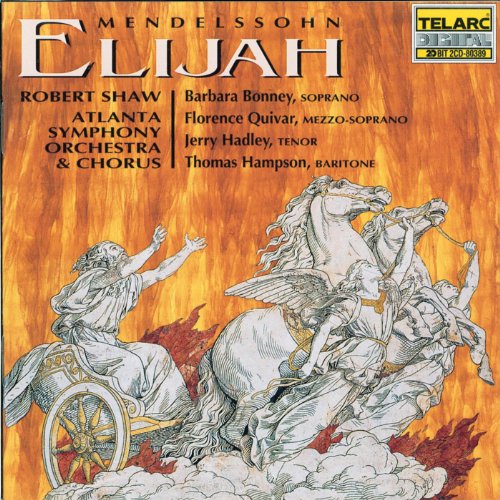 FQ: With the jet age as it is now, we are in an
age of instant music. You have to do things in order to compete.
You start singing it a while in advance, but jumping from job
to job to job, a lot of times you’re singing it in your voice during
rehearsals.
FQ: With the jet age as it is now, we are in an
age of instant music. You have to do things in order to compete.
You start singing it a while in advance, but jumping from job
to job to job, a lot of times you’re singing it in your voice during
rehearsals.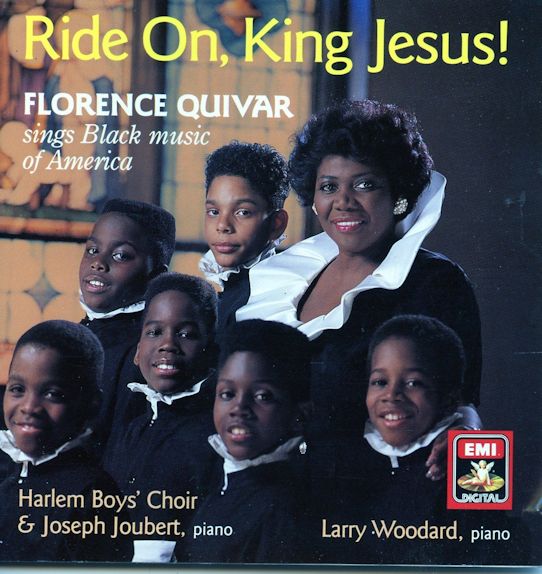 BD: This is another of the operas I would like to
see in the original French. So, did you do O, mio Fernando,
or Oh, mon Fernand?
BD: This is another of the operas I would like to
see in the original French. So, did you do O, mio Fernando,
or Oh, mon Fernand? 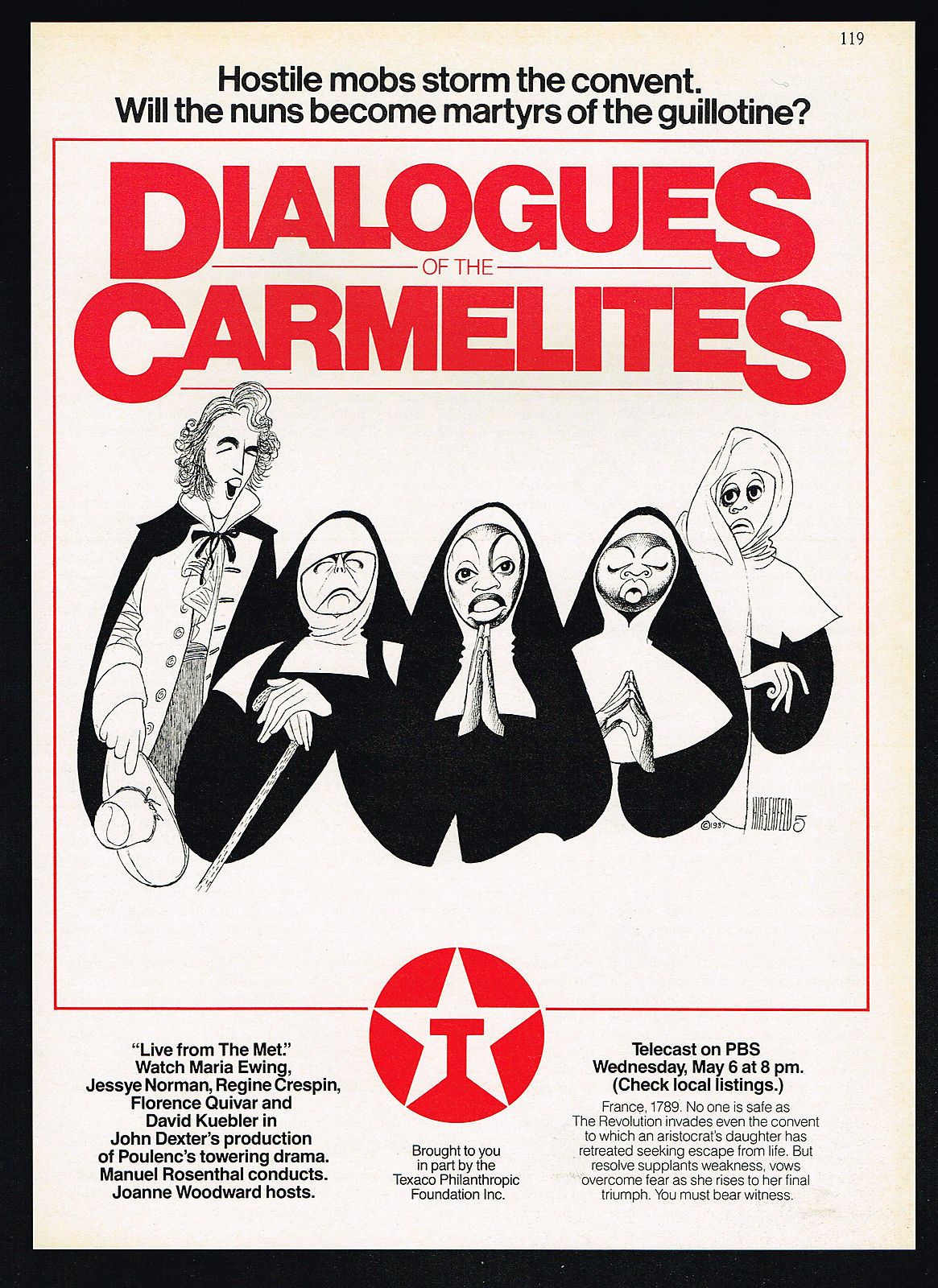
© 1992 Bruce Duffie
This conversation was recorded at the Ravinia Festival in Highland Park, Illinois, on August 24, 1992. Portions were broadcast on WNIB three months later, and again in 1994, 1997, and 1999. This transcription was made in 2018, and posted on this website at that time. My thanks to British soprano Una Barry for her help in preparing this website presentation.
To see a full list (with links) of interviews which have been transcribed and posted on this website, click here. To read my thoughts on editing these interviews for print, as well as a few other interesting observations, click here.
Award - winning broadcaster Bruce Duffie was with WNIB, Classical 97 in Chicago from 1975 until its final moment as a classical station in February of 2001. His interviews have also appeared in various magazines and journals since 1980, and he now continues his broadcast series on WNUR-FM, as well as on Contemporary Classical Internet Radio.
You are invited to visit his website for more information about his work, including selected transcripts of other interviews, plus a full list of his guests. He would also like to call your attention to the photos and information about his grandfather, who was a pioneer in the automotive field more than a century ago. You may also send him E-Mail with comments, questions and suggestions.